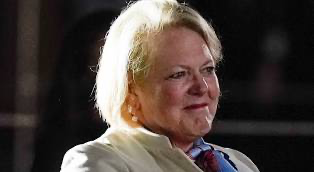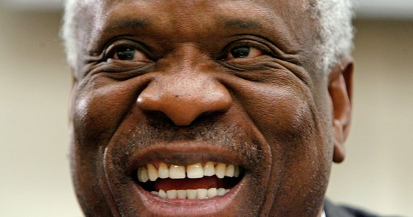Many years ago, Joe Biden and Clarence Thomas were above-the-fold front page news. Thomas was accused of behavior unbefitting a Supreme Court nominee. It was a political sideshow. Thomas called it a “high tech lynching.” Democrats called him unfit. The woman accuser was sacrificed on the alter of expediency, and Thomas was confirmed by a Senate vote of 52-48.
Today Biden and Thomas are back in the headlines, Biden as POTUS and Thomas as the Supreme Court’s senior Justice. And once again, Thomas is at the center of a political firestorm regarding his fitness to serve.
This time a different woman is sharing the headlines. Now, it’s his wife Virginia, aka Ginni, who has brought the matter forward. Documents reveal that following the November 2020 election, Mrs. Thomas, an ultra-conservative operative, was actively strategizing with White House Chief of Staff Mark Meadows to overturn the election and reinstate Donald Trump as president.

In July 2021, a House Select Committee was appointed to investigate the causes and events surrounding the January 6, 2021 attack on the U.S. Capitol. As part of the investigation, Meadows was instructed to appear and produce documents associated with his tenure. He refused and the case went to the Supreme Court. The court ruled in favor of the committee with Thomas as the lone dissenter.
This week it was revealed that the documents requested include 29 text messages exchanged between Thomas’ wife and Meadows. Sitting in judgment on that matter was a clear conflict of interest.
Most legal scholars agree Justice Thomas should have recused himself from consideration of that case and all subsequent cases involving events related to the insurrection. Unfortunately, while lower courts have rules governing conflict of interest recusals, the Supreme Court’s rules are vague and rely on the justices to police their own involvement. So far, Justice Thomas has remained silent on the matter of recusal.
We didn’t know when the case went up to the Supremes that her texts to the White House were included in the requested documents—but he did. Now that we know, should Chief Justice Roberts allow him to give a single-digit finger to the way justice is delivered on his court?
With changes in the composition of the court, Associate Justice Thomas has recently come into his own. When Justice Scalia was asked to compare his jurisprudence with Thomas’ he said, “I’m an originalist but I’m not a nut.” He has gone from being mocked and marginalized to mainstream. The justice who once went more than 10 years without asking a question during oral argument is suddenly positively garrulous. Scalia, the dominant conservative voice is gone. RBG the dominant liberal voice is gone. Anthony Kennedy the often-decisive vote is gone, and three very conservative justices appointed by Donald Trump have successfully tipped the scales in Thomas’ favor.

Time and the court, now unbalanced with a 6-3 tilt to the right, has given him power he never imagined he would have. For years his dissenting opinions were peppered with grievance and his jurisprudence widely seen as a way to strike back at those who opposed his nomination. In the last two years he has turned the tables and embraced his new role. As the senior conservative justice side, he is the one who assigns opinions when his side is in the majority.
In an era when norms have been obliterated in government and governance, Thomas is breaking new ground. For more than 230 years we believed in the blind woman holding the balanced scales of justice as the symbol of judicial impartiality. We no longer do. According to February 2022 Gallup Poll, only 40% of adult Americans have a favorable view and believe in the impartiality of the Supreme Court.
Court watchers lament the passing of the once widely held belief that politics should play no part in jurisprudence. In September of 2021, before he announced his upcoming retirement, Justice Stephen Breyer published a small book entitled The Authority of the Court and the Peril of Politics in which he defended the Supreme Court’s apolitical character, a defense that has been soundly criticized as condescending, naïve, and blind to reality. Lawrence Tribe, the Harvard Professor Emeritus and dean of American constitutional scholars who admires Breyer’s jurisprudence has called the book a “self-serving series of what can only be called platitudes.”
I agree. We can’t ignore reality and pretend the current court is apolitical. Supreme Court appointments are cyclical and, if history is any guide, it is likely the pendulum will swing back. In the meantime we can at least demand ethical behavior and well reasoned decisions from the sitting justices.

Recent decisions on voting rights, gerrymandering, restrictions on abortion, Trump administration policies, and Covid mandates – all delivered in unsigned “shadow docket” rulings without full hearings, briefs, or oral argument further undermine respect for the court and its authority.
Polls show that most Americans want assurance that we are governed by the rule of law. We may not like the way the court disposes of cases, but we believe the system is inherently good. We want honesty, fairness, and equity in all areas of our lives.
Some believe that expanding the number of justices or imposing term limits on their tenure, will rebalance the court, but neither is likely to “fix” what’s wrong. Court appointments have always had a political component, but since the days of the liberal Warren court, presidential appointments have become more partisan and the composition determined by deaths, retirements, and opportunities given the sitting president to fill the seat. No one could have predicted that Donald Trump would be able to nominate three justices and totally tip the scales to the conservatives.
Will it take another World War to unite us? Today our support for the people of Ukraine is uniting us in support of a sovereign democratic nation under attack. The confirmation of Ketanji Brown Jackson to fill the Supreme Court’s open seat is another opportunity for Senators to cross political lines and help restore the court’s reputation.
We can’t let Clarence and Ginni Thomas or the alt-right further denigrate our institutions. There are not two sides to this argument. The Supreme Court deserves our respect, but it needs to be earned. Justice Thomas and the Machiavellian machinations of Senator McConnell have undermined America’s confidence in the even-handed administration of justice. Restoring confidence in the Court will not come quickly. There is no quick fix.
In a recent Los Angeles Times Op-Ed, Erwin Chemerinsky, the dean of my law school alma mater, encouraged law students and their teachers to have faith that the Supreme Court can regain the respect for precedent and approach to the law it once had. “There really are just two choices: Give up or fight harder, even if there will be losses along the way. If we can instill in students a desire to defend justice, even if victory is distant, it will be a good semester, no matter what the Supreme Court decides.”
































Thanks Jack
Couldn’t agree more
I think term limits would help, but, of course, not immediately.
Personal character and judgment is what counts.
We need more John Marshall Harlans.
Tom
At his own hearing, Supreme Court nominee, Yale Law School graduate, Thomas testified under oath that he had never heard, read, not spoken of Roe v Wade.